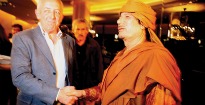How Journalists Got Mugged by Reality
 Nick Cohen writes:
Nick Cohen writes:
The former US Ambassador to the United Nations Daniel Patrick Moynihan composed an aphorism as he watched dictatorships pile opprobrium on democracies: "The amount of violations of human rights in a country is always an inverse function of the amount of complaints about human rights violations heard from there." Journalists, lawyers, academics and opposition politicians can investigate the injustices of democracies, and because they can investigate, injustice is kept in check. They cannot expose the greater atrocities of dictatorships because there is no freedom to report, and hence their greater crimes pass unnoticed.
I have my doubts about the universal jurisdiction of Moynihan's Law — America was responsible for many great crimes while he was its good and faithful servant. But his insight explains why Jeremy Bowen is blinking at his cameraman in Tripoli, like some startled, uncomprehending mammal who has been shaken by the convulsions around him from a hibernation that has lasted for most of his career.
The BBC's Middle East editor is not the only expert whose expertise now looks spurious. The Arab uprising is annihilating the assumptions of foreign ministries, academia and human rights groups with true revolutionary élan. In journalistic language, it is showing they had committed the greatest blunder a reporter can commit: they missed the story. They thought that the problems of the Middle East were at root the fault of democratic Israel or more broadly the democratic West. They did not see and did not want to see that while Israelis are certainly the Palestinians' problem — and vice versa — the problem of the subject millions of the Arab world was the tyranny, cruelty, corruption and inequality the Arab dictators enforced.
Put this starkly, it sounds as if the charges of double standards and anti-Semitism habitually directed at liberal Westerners are justified. But liberal prejudice — "anti-liberal prejudice" is a more accurate description — is a process as well as an ideology. Dictatorial states and movements shepherded liberal opinion into a one-way street by exploiting the logistics of news-gathering.
No news organisation in the West could base their main Middle Eastern bureau anywhere other than Israel, for the simple reason that it was the only free country with a free press, an independent judiciary and a constitution. Researchers and diplomats, as well as reporters, could phone or visit Palestinians in the occupied territories, as indeed could anyone else. Crucially, in an age dominated by images, television crews could get pictures. I am not saying that the authorities do not harass foreign or Israeli correspondents trying to report the undoubted violations of Palestinian rights, simply that they can report from Jerusalem but cannot from Damascus or Riyadh.
Even if the Baathists or Wahaabis let journalists in, they would place them under constant surveillance. Meanwhile any local invited to go on air to criticise his or her rulers would refuse because they knew that they would be running a terrible risk. Moynihan's Law explains why you never hear a BBC or Sky anchor announce, "We are going live to hear our Saudi Arabian editor on the oppression of women in Mecca," although if we are very lucky maybe we will soon.

